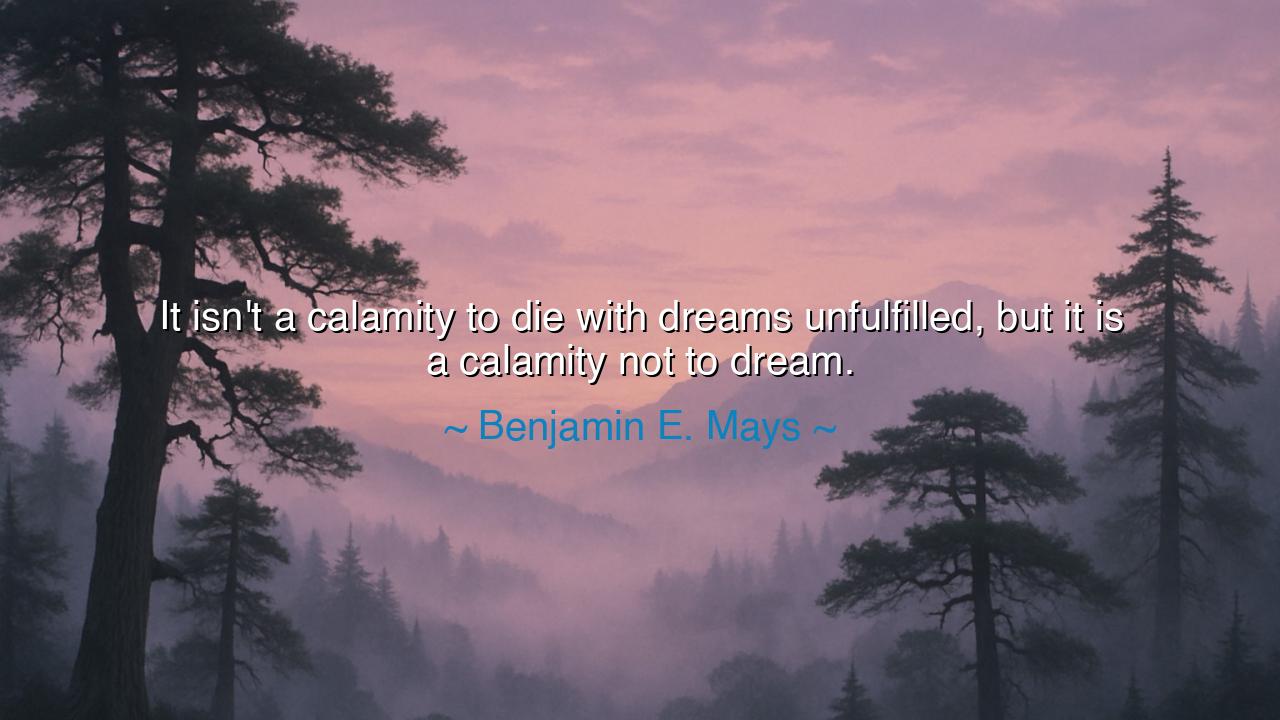
It isn't a calamity to die with dreams unfulfilled, but it is a






In the noble and enduring words of Benjamin E. Mays, mentor to Martin Luther King Jr. and a prophet of human potential, we are given a truth that burns like a lamp for every generation: “It isn’t a calamity to die with dreams unfulfilled, but it is a calamity not to dream.” These words are not the lament of a man disillusioned by time, but the triumph of one who understood the eternal value of vision. To Mays, the tragedy of life is not in failing to reach the mountaintop, but in refusing to climb. The dream itself — the act of daring to imagine something greater than what is — is the sacred breath of the soul.
The origin of this quote lies in Mays’s lifelong teaching about purpose and moral courage. Born in 1894, into a world shackled by segregation, he rose from humble beginnings to become one of the most influential educators and thinkers of his time. As president of Morehouse College, he inspired generations of young Black men to believe that education and faith were not merely tools for survival, but for transformation. His words about dreams reflect his philosophy: that life’s worth is not measured by the trophies of success, but by the boldness of one’s vision. For to dream is to affirm the divine possibility within oneself — to declare that life, however harsh, is still worth striving toward.
To say it is not a calamity to die with dreams unfulfilled is to free the human spirit from the fear of failure. Mays understood that no life can contain all its longings; no dreamer sees every vision realized. Yet the pursuit itself gives meaning to existence. The farmer who plants a tree whose shade he will never sit beneath is not defeated — he is fulfilled, for his dream extends beyond himself. The calamity, Mays warns, is not in dying without completing one’s dream, but in living without one. To live dreamlessly is to move through the world like a shadow — efficient, perhaps, but lifeless within.
Consider the story of Martin Luther King Jr., Mays’s most famous student. King’s dream — of justice, equality, and brotherhood — remains unfinished to this day. Yet his life was no tragedy. His dream continues to live and breathe in the hearts of millions, shaping nations and awakening consciences. He did not die in failure; he died in faith — faith that the dream, once spoken, would find new voices in generations to come. This is the essence of Mays’s teaching: that dreams outlive the dreamer, and that the courage to dream is itself a victory over despair.
Mays’s quote also reminds us that dreaming is a moral act. To dream is to resist cynicism, to refuse the idea that the world must remain as it is. Those who dream, even in dark times, are builders of the unseen. The abolitionist dreams of freedom; the artist dreams of beauty; the scientist dreams of discovery. Each contributes to humanity’s long ascent. Those who do not dream, who surrender to comfort or fear, become stagnant waters — still, but without life. The dreamer, even when wounded by disappointment, remains part of the living current of progress.
And yet, Mays’s wisdom carries humility. He does not promise that every dream will come true — only that the act of dreaming ennobles the soul. The dream may remain distant, but it gives direction, like a star that guides sailors across the night sea. To dream without demand, to strive without bitterness, to live with one’s gaze lifted to what could be — that is the path of greatness. Those who live this way, Mays teaches, never die in vain, for they have kindled a light that others may follow.
Therefore, O seeker of truth and purpose, take this lesson deeply into your heart: dare to dream, even when the world seems deaf to your vision. Let your dreams be vast enough to humble you, and bright enough to sustain you. Do not measure your worth by what you finish, but by what you begin. Dream for yourself, and dream for others. Plant ideas that will outlive you, for in doing so you join the lineage of all who have refused to live small.
And remember, as Benjamin E. Mays declared, the tragedy is not to die with dreams unfulfilled, but never to have dreamed at all. For a dreamless life is a living death — but the dreamer, even in defeat, walks with the gods, shaping worlds yet to come.






AAdministratorAdministrator
Welcome, honored guests. Please leave a comment, we will respond soon